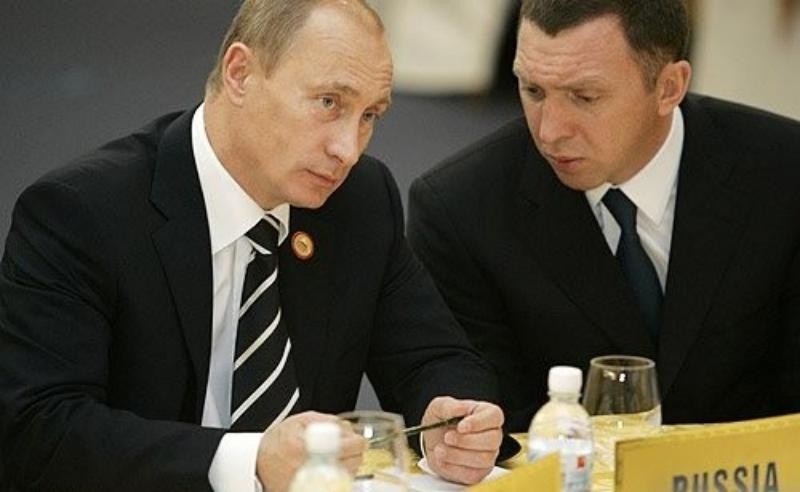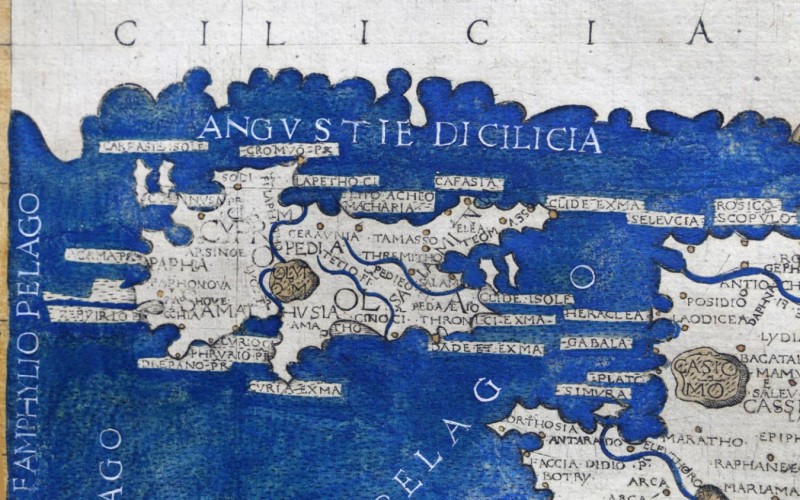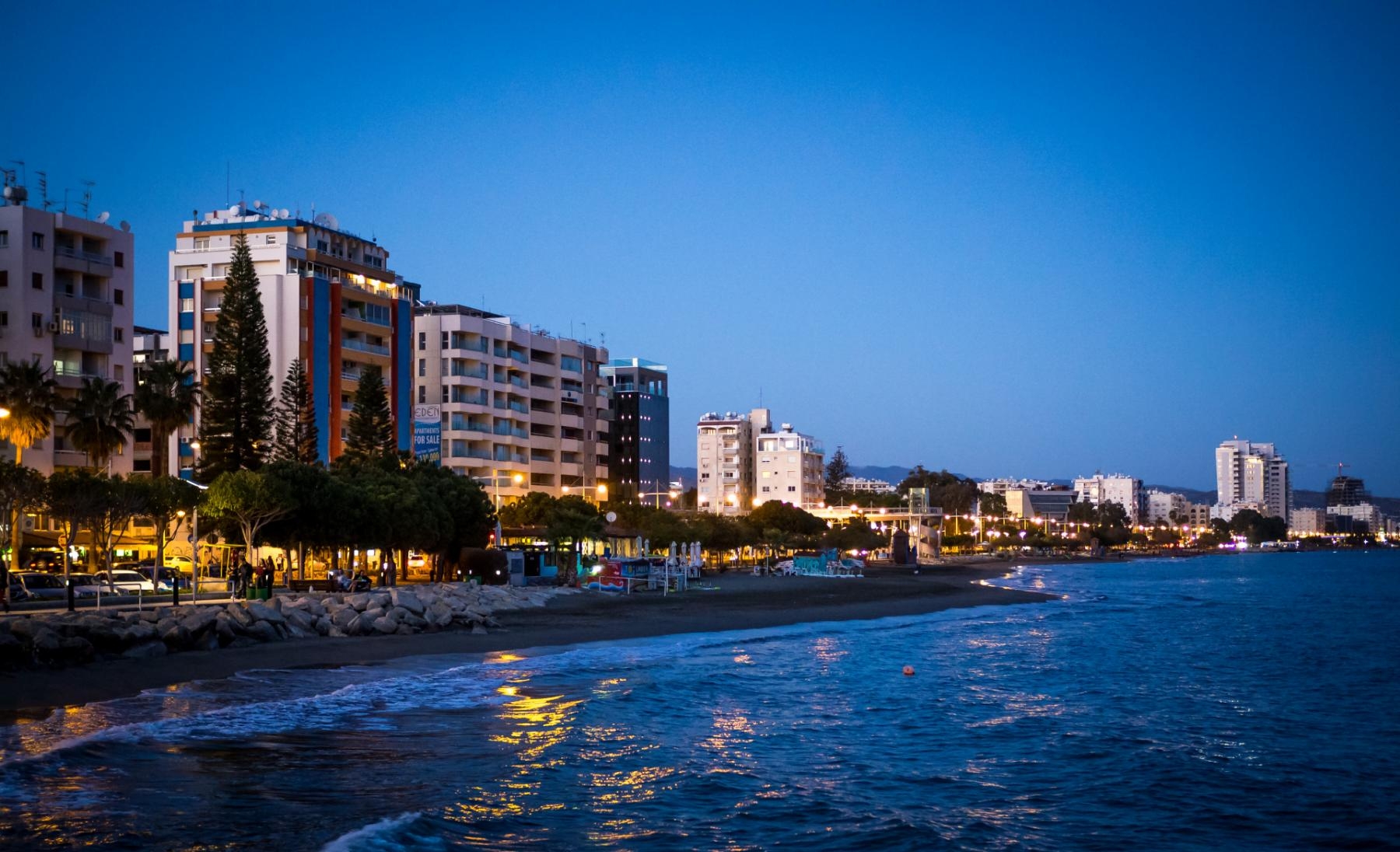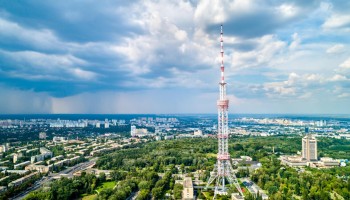Kypros Chrysostomides is one of Cyprus’s most elite lawyers, a wine connoisseur who boasts he was decorated by the French government and received the “Grand Cross of the Order of the Phoenix” from Greece, one of that country’s highest honors.
But to disgraced American political operative Paul Manafort, he was known as “Dr. K.,” the fix-it man.
Chrysostomides set up more than a dozen shell companies in Cyprus for Manafort and Manafort’s former associate Rick Gates. Through those companies, the two American lobbyists received payments for political consultancy work in Ukraine and wired more than $30 million, some of which was used to make various purchases in the United States, while avoiding U.S. taxes. Overall, Manafort’s companies shifted more than $75 million through offshore accounts.
Bank accounts for the shell companies that Chrysostomides created funneled payments to the United States from offshore businesses of political allies of ex-Ukrainian President Viktor Yanukovych — whom Manafort and Gates referred to as Big Guy, or BG. The transfer requests were sent directly to Chrysostomides’ law firm in Nicosia, an address that was also the headquarters for all of the shell companies, according to Gates’ testimony at Manafort’s August 2018 trial in U.S. federal court on charges of fraud and financial crimes.
Special Counsel Robert Mueller homed in on Manafort, a former campaign manager for U.S. President Donald Trump, in his probe of Russian interference in the 2016 U.S. presidential election, which shed light on Manafort’s business activities.
Dr. K, however, appears to have suffered no more than some bad publicity, and OCCRP hasn’t uncovered any evidence suggesting he ran afoul of the law. He remains one of the most powerful and respected figures among a large group of Cypriot lawyers who wittingly or unwittingly enable powerful people to commit crimes and then hide behind a law firm.
“Neither I nor any member or associate of our firm have ever advised any client to commit any breach of any rules of national or international law,” Chrysostomides said in a statement responding to questions. “Any such insinuation is nothing but a malicious statement, without any support whatsoever.”
Manafort’s and Gates’ actions were aired in the U.S. media in the months leading up to Manafort being sentenced to seven-and-a-half years in prison. (Manafort subsequently lost his license to practice law as well.) Dr. K’s role is less well-known. American media have occasionally referred to him as a “middleman lawyer” and used his nickname.
Chrysostomides is a veteran politician who served as spokesman for a government known to be friendly to Kremlin hardliners and other Russian business interests. He was even, briefly, Cyprus’s justice and public order minister. He also heads his own fringe political party, the Movement to Restructure the Center (MRC), for which Manafort consulted about a decade ago.
Lawyers serving in multiple roles, including as leaders of political parties, aren’t rare in Cyprus. President Nicos Anastasiades was a partner in a law firm that served Russian oligarchs while he headed his political party until he was elected president in 2013.
Chrysostomides also personifies the contradictions at play in Cyprus, a center of international finance and a European Union member that has come again under the Kremlin’s sway — even as it aims to improve ties to the United States and U.S. allies. And his career is a prime example of how Cyprus’s corporate services industry frequently has aligned with various Eastern European political factions, serving the interests of oligarchs from Russia or Ukraine while remaining deeply linked to the highest levels of the Republic of Cyprus’s government.
Murky Financial Deals
Cyprus became a major destination for Russian capital after the fall of the Soviet Union, largely thanks to a double-tax treaty signed in 1982. The island state, which allows non-EU citizens to open companies, purchase real estate, and acquire citizenship via a fast-track Golden Visa program, became even more attractive to wealthy Russians when Cyprus joined the EU in 2004 and adopted the euro in 2008.
A senior fellow at the Alliance for Securing Democracy (ASD), a bipartisan group affiliated with the German Marshall Fund of the United States (GMF) and established in response to Russian interference in the 2016 U.S. presidential elections, said Cyprus has undergone “state capture” by its offshore financial sector.
The system includes law firms with ties to politicians — like Chrysostomides’ — and the one Anastasiades established. The firms that provide assistance to people with criminal intentions are often said to be part of the criminal services industry and some of the biggest corruption scandals in Europe end in a Cypriot law firm which invariably refuses to identify its clients.
“Offshore financial services have a very large role in the economy, which gives them a lot of influence,” said ASD’s Joshua Kirschenbaum, who formerly oversaw international money laundering probes as an official with the U.S. Treasury Department’s Financial Crimes Enforcement Network. “That influence is enhanced by the strong political connections of the banks and the other service providers to current and former government officials. Law firms are one of the ways that that influence is channeled.”
The too-cozy relationships hurt Cyprus’ reputation, its international business relationships, and its interactions with the U.S. government and other Western governments, Kirschenbaum said.
A Divided Island
Kypros Chrysostomides was born in 1942 to an ethnically Greek family in the village of Kathikas, a wine-producing community on the west coast of Cyprus with fewer than 500 inhabitants as of 2011.
At the time, the strategically located Mediterranean island was still a British colony populated for centuries by ethnic Greeks and Turks.
The nation gained independence in 1960 based on a power-sharing agreement between the two communities. The first post-independence leader, Archbishop Makarios, was a Greek with nationalist ambitions.
His efforts to drive the Turkish Cypriot community out of Cyprus destabilized the island and led to a Greek coup against him in 1974 and a Turkish invasion in response. This is the defining event of post-independence Cyprus, a nation that finds itself 45 years later still ethnically divided. A cease-fire line runs directly through the capital, Nicosia, separating the Turks in the north and the Greeks in the south.
“Cyprus became an open wound for the west to Russia’s benefit,” said Makarios Drousiotis, a Cypriot historian and author of several books about the country’s post-independence history.

Chrysostomides studied law in Athens, Luxembourg, and Bonn, where he obtained a doctorate in the subject. He also married well. His wife, Eleni Chrysostomides, is the sister of prominent lawyer Polys Polyviou, whose law office employs relatives of Supreme Court judges and represents the Bank of Cyprus, the island’s largest banking and financial services group.
That union gave Chrysostomides entree into the “lawyer elite,” one of the most influential forces in Cyprus, Drousiotis said. The island’s politics are dominated by lawyers; four of the nation’s presidents since independence have been attorneys.
In 1981, Chrysostomides established his own firm, Dr. K. Chrysostomides & Co LLC. He also began building a reputation as one of Cyprus’s leading experts in international law, writing a book on the topic and representing clients at the European Court of Human Rights in cases involving displaced Greek Cypriots and others affected by Turkey’s 1974 invasion.
Like many local Cypriot lawyers, he also took on clients with links to Russia and Ukraine.
The former law firm of current president Anastasiades, for example, provided services to Vladimir Strzhalkovsky, who media has identified as a former KGB officer and who served as deputy minister for economic development in Russia. He also co-chaired the Bank of Cyprus for a short period before departing under hazy circumstances in 2015. The president’s former firm also reportedly provided services for energy and movie-producing businessman Leonid Lebedev. And a previous Cypriot president, Tassos Papadopoulos, has been linked to the laundering of hundreds of millions in Deutsche marks by former Serbian leader Slobodan Milosevic. (U.S. Commerce Secretary Wilbur Ross formerly served as vice chairman of the Bank of Cyprus.)
As for Chrysostomides, his clients include not only Manafort, but also former Ukrainian President Petro Poroshenko and Russian billionaire Oleg Deripaska, whose business survived and prospered after he came out of the 1990s so-called aluminum wars in control of Rusal, the world’s second largest aluminum company. Recently Deripaska has been under U.S. sanctions for more than a year in connection to Russia’s annexation of Ukraine’s Crimea Peninsula. Sanctions against his businesses were lifted in January.
The Panama Papers — documents obtained by Süddeutsche Zeitung and shared with the International Consortium of Investigative Journalists (ICIJ) — revealed that Chrysostomides also provided corporate services to Ruslan Baisarov, now the chairman of the board of OOO Stroygazconsulting, an energy infrastructure construction firm. With the help of the Panamanian law firm Mossack Fonseca and Chrysostomides, Baisarov partnered with Russian copper tycoon Igor Altushkin to acquire Rodton International Company Assets Inc., a British Virgin Islands company at about the same time they acquired one of the world’s largest coal reserves in the south central Russian republic of Tuva. Chrysostomides’ firm helped establish and later liquidate Rodton.
Legal Eagle
Several factors make Cyprus a popular destination for company registration. It offers a low 12.5 percent corporate tax rate, exempts non-residents from dividend taxes, and is party to an extensive list of treaties that help companies avoid double taxation. The country is also a member of the EU and English is widely used for business.
These advantages have made the island an appealing place to set up convoluted financial structures, and more than 218,000 companies are registered on the island today. That’s one for every four residents, though the number is down from its all-time peak of 272,157 in 2013, when the country experienced its worst-ever banking crisis. Many of the companies used in criminal schemes are fronted by these omnipresent Cypriot law firms.
Demand for financial and company formation services has pushed the number of lawyers in Cyprus to more than 3,900 for a population of less than 900,000, one of the highest densities in the EU. The financial sector business combined with a relatively low crime rate has meant that some Cypriot lawyers rely on tax advisory and company formation services more than on litigation and court cases for business, according to Floris Alexander, a Dutch financial crime lawyer who previously provided fund recovery services in Cyprus and advises Danske Bank investors.
Starting in 1980, when the nation’s offshore sector was still in its infancy, Chrysostomides began creating a constellation of companies known collectively as Inter Jura.
Inter Jura wasn’t and isn’t formally affiliated with Chrysostomides’ law firm, but almost all its companies share the firm’s headquarters on Lampousas Street in Nicosia. Inter Jura Cy (Services) Ltd., Inter Jura Cy (Nominees) Ltd., and Inter Jura Cy (Publishers) Ltd. were established in 1980. These were followed three years later by Inter Jura Cy (Holdings) Ltd., Inter Jura Cy (Management) Ltd., and Inter Jura Cy (Trust) Ltd.
Most of the shares in Inter Jura (Holdings) are held by Chrysostomides’ wife Eleni and a daughter Georgia, both of whom work at his firm.
In 2007, when Chrysostomides was a member of Parliament and simultaneously offering services to Manafort and Deripaska, he established five more companies: Inter Jura Cy (Accounts) Ltd. (now named ACS Accountserve Ltd.), Inter Jura Cy (Directors) Ltd., Inter Jura Cy (Estates) Ltd., Inter Jura Cy (Global) Ltd., and Inter Jura Cy (Secretaries) Ltd. The directors of the various Inter Jura companies frequently overlap with the names of lawyers at Chrysostomides’ firm.
It’s unclear what all of these companies do, though Rick Gates has testified that Inter Jura acts as director for the companies it sets up. Hundreds of businesses list at least one individual associated with Inter Jura as a director or secretary, suggesting Inter Jura provides nominee directors, secretaries, or shareholders that allow entrepreneurs to conduct almost all aspects of their business without their identities being public.
Providing such corporate services is legal and setting up shell companies using nominee shareholders or directors is a common practice among those who seek to conceal the sources of their wealth or hide how they do business.
Ukraine’s former President Poroshenko, for example, hired Chrysostomides to set up a complex network of offshore companies that would allow him to keep controlling his candy business, Roshen, though he had publicly promised to divest after being elected, OCCRP revealed in 2016.
Oleg Deripaska also relied on Chrysostomides’ services to expand his aluminum, mining, and construction empire, and his En+ Group is still a client of Inter Jura Cy (Services) Ltd. This did not, however, deter the Russian oligarch from going to court to compel it to disclose documents related to a lawsuit he filed against Gates and Manafort, in which he accused the Americans of embezzling funds that rightfully belonged to him. Manafort also appears to remain a client of Chrysostomides.
There are more than five dozen other companies registered at 1 Lampousas Street or otherwise linked to the Chrysostomides law firm or affiliated companies, including Agroton Public Ltd., the eighth-largest agricultural landholder in Ukraine, according to corporate records revealed in the Panama Papers and Paradise Papers leaks. Agroton’s main shareholder is also a Chrysostomides customer.
“It is not surprising that oligarchs such as Deripaska, Vekselberg, and other wealthy people find Cyprus attractive,” said Alexander, the Dutch financial crime lawyer. “It was not a surprise to see Manafort doing business in Cyprus.”
Yet, as part of Cyprus’s efforts to clean up its reputation, last year its central bank told banks to avoid doing business with shell companies. The move unsettled enough Russian entrepreneurs that it prompted a public complaint from the Russian ambassador.
Cycling Through Cyprus
Manafort was led to Cyprus by a cadre of wealthy Ukrainian businessmen allied with former Ukrainian President Viktor Yanukovych. With Yanukovych president and his Party of the Regions regaining power in Ukraine, Manafort was at the pinnacle of his international political consulting career.
Between 2007 and 2012, Chrysostomides’ law firm and Inter Jura set up or administered at least 13 new shell companies with Manafort or Gates or both as their primary beneficiary. All were headquartered at 1 Lampousas St.
According to Gates’ testimony in Manafort’s trial, Yanukovych’s political allies directed Manafort to buy pre-registered “shelf” companies in Cyprus, a tactic they themselves were already using. Wiring funds “from Cyprus to Cyprus” would be the simplest way for the Ukrainians to pay him. An unnamed business associate put Manafort in touch with Chrysostomides, to help out with political work.
According to Gates, wealthy leading members from Yanukovych’s Party of Regions and other allies — among them Rinat Akhmetov, Serhiy Lovochkin, Serhiy Tihipko, Borys Kolesnikov, and Andriy Klyuyev — all wired funds from accounts of companies they maintained in Cyprus to companies set up by Chrysostomides on Manafort’s behalf.
As the money flowed in, Manafort was wiring millions of dollars from Cyprus to the United States to pay for antique rugs, expensive men’s clothing, Range Rovers, and other luxury items, according to court documents. He also purchased a $3 million brownstone and a $1.5 million condominium in New York City with money wired from the Cyprus accounts.
Manafort later directed Gates to disguise income from his Ukraine business as loans to reduce his taxable income. This makes it difficult to determine whether Manafort was actually in debt to Ukrainian interests, as some media outlets have reported, or if the debt was just on paper. Manafort’s companies had become “a complex web of more than a dozen entities that transferred millions of dollars among them in loans, payments, and fees,” according to a July 2017 article in The New York Times.
“Some Political Election Work”
Manafort didn’t confine himself to just handling his finances in Cyprus. After all, it was political work that led him to Dr. K.
“We worked on some political election work for a candidate, and that individual was also our attorney in Cyprus for our business matters,” Gates testified in proceedings against Manafort, a reference to Chrysostomides.
“In 2008, Cyprus was having a presidential election. Mr. Manafort had been contacted by a business associate and asked us to meet with them and assess whether or not he had a prospect of not only running in the race but potentially winning,” Gates said.
In 2008, Chrysostomides didn’t run for president, but joined the cabinet of President Demetris Christofias, then the leader of the communist party AKEL.
Gates didn’t name the business associate who had asked for the assessment. However, court records show that when Manafort and Chrysostomides did produce a memo on “Dr. K’s” political prospects, it was addressed to Deripaska, the Putin crony and fellow client of Chrysostomides at the time, who has been under U.S. sanctions for more than a year.

Deripaska’s name surfaced repeatedly in the Mueller probe due to his long association with Manafort, whom the oligarch had hired as an adviser to improve his reputation, especially in the United States. The 2009 memo on Dr. K drafted by Manafort and Chrysostomides briefly laid out how Manafort’s consulting firm, Davis Manafort, would work with Chrysostomides to raise the fledgling politician’s international profile, especially within the EU and U.S.
“Additionally, as we have discussed, we need to access your [Deripaska’s] network to position KC properly, both in Europe and how it is portrayed in Cyprus,” the memo said.
It proposed scheduling meetings between Chrysostomides and “various EU commissioners, high profile members of the EU political elite, and introducing him to similar persons of interest outside the EU,” as well as promoting the lawyer as a speaker at conferences and think-tank events.
There was no information to suggest that Deripaska responded to the memo or provided assistance in raising Chrysostomides’ political profile. At that time, the global financial meltdown was also hitting Deripaska’s assets, and his relationship with Putin was temporarily souring.
Although the memo proposed that candidates of Chrysostomides’s MRC party run in the May 2009 EU elections and Cyprus’s 2011 parliamentary elections, this never occurred. The memo also exaggerated the size of the party’s membership, as well as Cyprus’s electorate as a whole.
While Manafort’s plan to aid his Cypriot lawyer in politics doesn’t appear to have borne fruit, the relationship of Manafort and Deripaska with “Dr. K” persisted.
Around 2012, Chrysostomides helped Manafort move his offshore accounts out of Cyprus, according to Gates. It was just in time: Precisely that year, the Cyprus Popular Bank where Manafort maintained accounts was nationalized. Even before the bank went out of business in March 2013, it shut down several of Manafort’s accounts, citing his failure to comply with anti-money-laundering regulations.
At some point Chrysostomides helped the consultant establish new accounts in St. Vincent and the Grenadines, an offshore tax haven in the Caribbean, Gates testified. He also assisted Manafort in removing his name from his Cypriot accounts, as the U.S. lobbyist feared that a lawsuit he was engaged in with an unnamed Ukrainian would expose information about him and the Ukrainian businessmen from whom he had been receiving payments.
Chrysostomides, who responded to requests for comment for this story via a statement forwarded by his lawyer, said that his law firm is “bound by strict professional rules of confidentiality and etiquette,” and that he couldn’t respond regarding his client’s affairs. Any comment, he added, would require the client’s consent or a court order.
“Of course, I should state most categorically that neither I nor any member or associate of our firm have ever advised any client to commit any breach of any rules of national or international law,” he said. “Any such insinuation is nothing but a malicious statement, without any support whatsoever. Indicative is the fact that a number of the names mentioned as our firm’s clients are names not known to us.”
Chrysostomides, in the statement sent by his lawyer, said that while he had long ago retired from politics, it is the right of every citizen of Cyprus to engage in political activities. Chrysostomides recently has been an adviser to President Anastasiades on the issue of solving the island’s longstanding divide.
The Cypriot president’s press office didn’t respond to a request for comment nor did the law firm, Nicos Chr. Anastasiades & Partners LLC, named after President Anastasiades. Deripaska (contacted via the media relations company that spoke on his behalf last year) and Manafort contacted via his lawyer, also didn’t respond.
End of an Era?
In recent years, amid increasing geopolitical tensions between Russia and the West, Cyprus has come under pressure from the EU and the U.S. to step up anti-money laundering efforts and ensure compliance with individual and corporate sanctions against oligarchs and their businesses in connection with, for example, human rights abuses and the annexation of Crimea.
About a year ago, Cyprus launched a public relations campaign to inform stakeholders abroad about changes introduced after 2013 in its anti-money laundering framework. The measures stem partly from pressure by international creditors and the U.S. and are an attempt to improve Cyprus’ reputation as a haven for money laundering. The country also announced additional action against shell companies.
At the same time, the island’s government is courting U.S., French, and other oil interests to help develop hydrocarbon reserves discovered in its exclusive economic zone.
The increasing alignment with the U.S. in the area of sanctions and anti-money laundering has earned the island’s government recognition from the U.S. and negatively affected its relationship with Russia, whose ambassador has complained about the impact on Russian businesses. (Russian Bank deposits in Cyprus fell sharply from 11.76 billion euros at the end of 2013 to 4.95 billion euros in January of this year, according to a local news outlet, which cited central bank data. In the last two years alone, Russian deposits declined by 2.44 billion euros. )
Still, Cyprus’s corporate services industry may not have to entirely give up its lucrative Russian business, according to a former banker and financial markets supervisor.
“The balance Cyprus has to maintain is delicate because (of) the interests of both the Americans and the Russians,” said Marios Clerides, a former Hellenic Bank Group and Cyprus Cooperative Bank executive and former chairman of the Cyprus Securities and Exchange Commission.
“The Americans are not supporting us because they like our looks,” he said, adding that the relationship has more to do with growing geopolitical tensions between the U.S. and Turkey.
Indeed, both Deripaska and Manafort still maintain companies registered in Cyprus. And Viktor Vekselberg, another U.S.-sanctioned Russian billionaire and Putin associate, remains the largest shareholder of the Bank of Cyprus.







